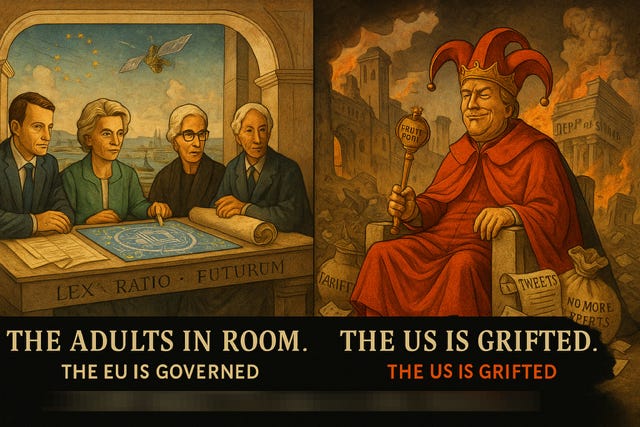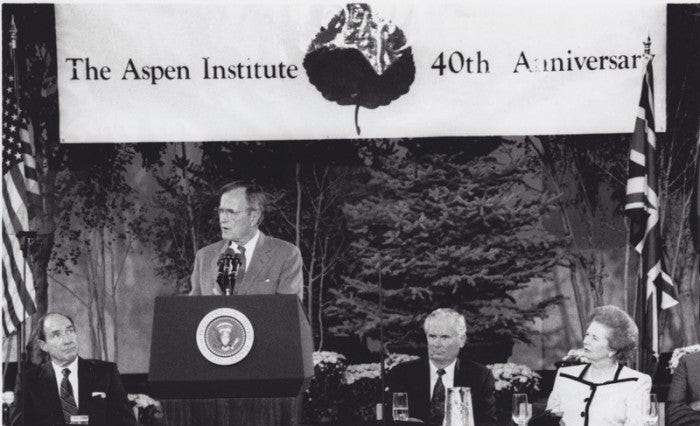The EU Is Governed. The US Is Grifted. The Adults in the Room: How the EU Is Outperforming Trump’s “Un-Policy” Presidency
Cultural Updates Now Available Brought to you by HumanistFreeAudio
Analog Reactions in an AI Age
He left early.
Trump stormed out of the 2025 G7 summit like a reality star ditching a script he never bothered to read—rushing home not to broker peace, but to posture in front of cameras over yet another Middle East crisis only made worse by his own involvement.
An Iranian fast boat blinked in the Strait of Hormuz. A war room flickered in Mar-a-Lago? Washington? Do we even bother to use SCIFs anymore? The president’s reflexes—stale, theatrical, and Cold War–calibrated—kicked in like clockwork.
Forget AI governance. Forget green energy compacts. Forget the trillion-dollar question of post-dollar multipolarity. Forget Africa’s tech leapfrog, or the Global South’s shifting loyalties, or the legal architecture of machine learning in conflict zones. The president had something far more pressing to do: relive the Bush era, pretend it’s Reagan’s, and tweet like it’s 2010.
America preoccupied by the Middle East? Again? Groundbreaking.
And that’s the tragedy. In an age of generative diplomacy and AI-led deterrence, America is still playing oilfield chess with a checkers mindset. The rest of the world has moved to quantum. Trump is stuck in analog.
While Macron convened an emergency side panel on deepfake disinformation and von der Leyen unveiled the EU’s next-stage quantum communications hub, Trump was screaming about tanks at his birthday and threatening sanctions recycled from administrations ago.
It’s not that he’s responding to the wrong threat. It’s that he’s reading from the wrong century.
There’s nothing strategic about sprinting home from a summit of the world’s most advanced democracies to re-stage a Persian Gulf power play only days after he was pushing that very same country for a deal. Quick. Now. Do it. Stop thinking and sign. There’s nothing “strong” about skipping a face-to-face with 44% of the world’s GDP and ostensibly our strongest allies—even if you think the situation in Iran to be grave. Call back to when Margaret Thatcher told George H.W. Bush in an aside at an Aspen Institute conference, “Remember George, this is no time to go wobbly.” There a U.S. President was. At an international conference, showcasing he was able to both managing an invasion by homicidal dictator and discuss the shape of the new global community post the fall of the Berlin Wall. And all this before smartphones.
This foreign policy doesn’t even have the byproduct of nostalgia. It’s the part where you awake from a nightmare.
The rest of the group? Stayed. Negotiated. Governed.
Trump? He grifted the moment. Then left the room.
Governed vs Grifted In The Know-Nothing Century

Sorry, we’re not sorry, America: Europe is being governed. America is being grifted.
In 2025, the European Union has done the unthinkable—it matured. Millenia old. Amid global unrest. Climate unraveling. AI upheaval. The EU summoned strategy from bureaucracy, summoned statesmanship from spreadsheets. It’s not always elegant, and rarely fast. But it is real.
The United States, meanwhile, has slipped into something darker than dysfunction. It is the cruel and unsightly disguised as sovereignty. Policy gutted, replaced by pejoratives and punishment. A country that once landed men on the moon now thinks leadership is a 3 a.m. truth post and a breaking up entire labor model systems because they don’t like certain skin tones.
The Bloc That Grew a Backbone
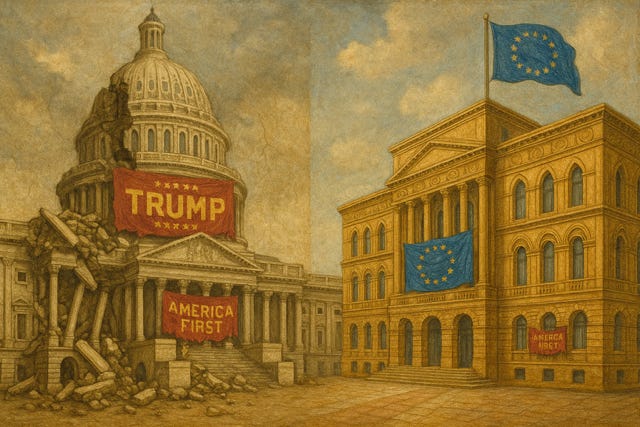
Let’s start in Brussels, where the grown-ups are at the table—and they didn’t come to gossip.
Macron is everywhere: flying into Greenland to court climate diplomacy, reshaping Africa relations with hard truths and hard cash. Ursula von der Leyen is fashioning digital law into geopolitical leverage. Lagarde is mobilizing the euro—not with missiles but with metrics. Donald Tusk, back with spine intact, is reminding the bloc that democracy is worth defending, and worth defining.
They are not perfect. But they are present. And they are playing to win.
Europe is no longer shuffling around the edges hoping history doesn’t come down on them too hard. It’s shuffling priorities—with clarity, cunning, and a historical memory America abandoned somewhere between book bans and trans athlete meltdowns.
From Eurocrats to Empire Engineers

You can scoff at “strategic autonomy,” but you can’t deny the numbers.
€207.6 billion. That’s what the EU’s Digital Decade budget has mobilized across infrastructure, semiconductors, AI ethics, and cybersecurity. America used to believe the best defense was a good offense, now the EU isn’t just believing it, they’re building upon it. Brussels is building systems that don’t depend on Silicon Valley—or Beijing.
The AI Act passed last spring? The first real attempt anywhere on Earth to make algorithms accountable. Not a think piece. Not a tech bro’s LinkedIn post. Law.
Meanwhile, the ECB—under Lagarde’s laser logic—is decoupling Europe’s financial fate from the dollar. They call it “the Global Euro moment.” We covered that a month ago, if you want to catch up here. It’s boring. It’s brilliant. And it’s the kind of boring brilliance that builds empires, not audiences.
Defense Without Drama

While Trump replays the Greatest Hits of Parade Populism™, Europe is quietly rewriting the rules of deterrence.
France and Poland are racing toward 4% of GDP in defense spending—not because Trump told them to. Quite the opposite, they now know Trump is irrelevant in any equation that includes the letters: K-G-B, and by that we mean: Vladimir Putin. They can read the map, unlike Don. The European Defence Agency is stress-testing everything from supply chains to satellite disruption. NATO, once mocked on MAGA stages, is now a stage for real coordination—and it’s slowly dealing the US out of its exercises. And, as Bloomberg notes:
And unlike Washington’s obsession with legacy systems and defense contractor kickbacks, Europe’s rearmament has strategy: shared command structures, domestic production, energy contingency. No drama. Just design.
Tech Sanity vs. Tech Fantasy

Here’s the clearest split: Europe uses smart regulations for the future. Trump deregulates the present and then tries to tweet it into the past.
Europe has launched the world’s first legally binding AI framework. That’s civilization-level thinking. Trump, meanwhile, signed Executive Order 14179, scrapping AI oversight and inviting Silicon Valley to “lead free from ideology”—translation: lead free from accountability.
Europe sees data as dignity. Trump sees it as something to harvest, hoard, and hock.
While von der Leyen wrangles neural networks, Trump is still pitching NFTs.
Foreign Capital vs. Feudal Cartels
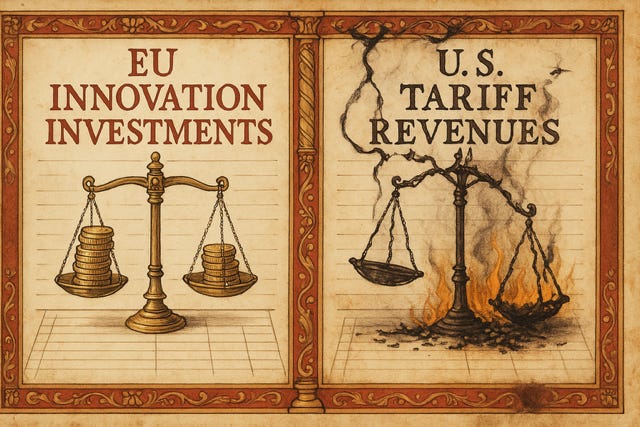
In Europe, capital is courting conscience. Macron’s team is pioneering green investment ties with sub-Saharan Africa. Germany is looping Indonesia and Brazil into strategic trade pacts. The EU Investment Screening Mechanism now filters autocrats without scaring off democrats. It’s not charity. It’s calculus. It’s just the kind of thinking that built the American Century through the Marshall Plan. Now, the U.S. is in the Know-Nothing Century.
Meanwhile in the States? A 25% tariff on Canada. A 90% aid slash to Ukraine. Global investors are heading for the exits as Trump mulls taxing foreign capital for “disloyalty” as The Economist noted.
Protectionism, for sure. It’s economic nativism in a red hat, absolutely 10000%. And don’t be surprised if Trump bellows: “10000% tariffs on the country of Mattel!” A tax regime built not to grow power but to punish proximity.
Trump’s foreign policy is a gated community for the well-connected. And by connected, we mean connected directly to a Trump entity’s bank routing or wire number. Europe’s is a labyrinth—yes—a very frustrating one, but at least it leads somewhere.
⸻
Case Study: Charles V at the Diet of Worms vs. Francis I Chasing Glory in Italy
An Early Modern Mirror for 2025
You didn’t think you were going to escape without us mentioning Charles V, did you? The year was 1521. The stage: the Diet of Worms. Charles V, Holy Roman Emperor, was presiding over the most dangerous theological rift in a thousand years. Martin Luther stood trial for shaking the foundations of Christendom. The stakes? Not just faith, but the fragile fabric of a continent stitched together by diplomacy, dynastic marriages, and debt.
And Charles stayed.
He debated. He delayed. He convened councils. He sought to hold together a polyglot empire of fracturing loyalties. Was he flawless? Hardly. But he understood the magnitude of the moment. He governed because he had to. He governed because someone had to.
Meanwhile, over the Alps, Francis I of France was doing the opposite. He was launching another glory-soaked Italian campaign. Chasing cities. Chasing titles. Chasing the ghost of Caesar in spiffy Renaissance boots. While Charles wrangled parliaments and papal bulls, Francis was plotting another raid on Milan, another siege that history would forget before the ink dried.
Francis called it honor. History called it indulgence.
⸻
In our century, the parallel is uncanny:
• Charles V is the EU: tangled, technocratic, painfully slow—but built to withstand storms.
• Francis I is Trump (sorry, Francis): impulsive, performative, obsessed with theatrics over treaties.
Trump rushes out of G7 like Francis charging into Lombardy. Macron stays, like Charles at Worms, to broker a new digital doctrine for the modern age.
Francis bankrupted France for a throne he never claimed. Trump bankrupts trust for applause he never earned.
One built The Habsburg legacy. The other burned papal bridges for headlines.
Sound familiar?
In 2025, the institutions still standing are the ones built by those who stayed in the room. The EU is still in the room.
Trump, like Francis, is out chasing shadows.
The White House as Punchline
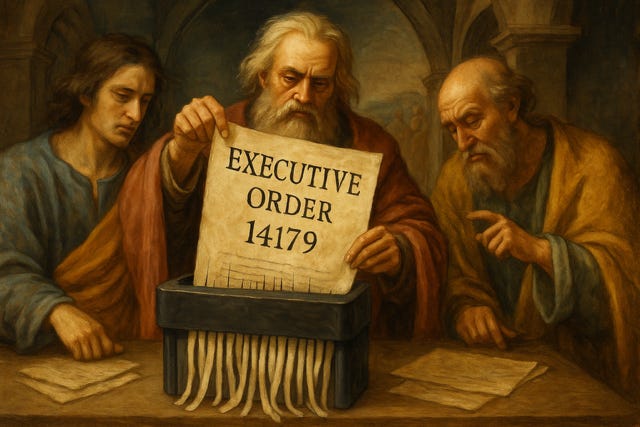
Trump’s America is close to being a failed nation-state—with the dark forces of regression pulling at the fibers of the United States as just that: united. A melting pot. A cross-section of the globe.
The administration is being puppeteered by the Project 2025 playbook: purge civil servants, consolidate power, replace expertise with ideology, then laugh as the republic groans.
Trump isn’t leading a government. He’s monetizing a movement.
Where Europe has presidents fluent in law, economics, and diplomacy, America’s president is fluent in feuds, vendettas, and vintage reruns of himself.
Memory Is Europe’s Weapon

Europe remembers the 20th century. That is its power.
It remembers the price of inflation, the poison of fascism, the fragility of borders, the silence of mass graves. And it governs accordingly. Slowly. Stubbornly. Soberly.
Trump’s MAGA America remembers nothing. Or worse—it remembers selectively, inaccurately, and cruely. It does not see history as instruction. It sees it as insult.
What does it mean when the European Union, that Byzantine bundle of 24 official languages and 27 legislatures, is now the voice of stability—and the United States of America is the punchline?
It means something is rotting in Washington. And something is rebuilding in Brussels.
The Renaissance Reboots Elsewhere
The European Union is staging a return not to grandeur, but to governance. Backroom-dealing again. Branding itself again. Better on its future again. Being independent again. And good. It aims to be good.
Because Renaissance republics were not built on chaos. They were built on coin, code, commercial cooperation, and cunning. They were built by committees, councils, ledgers, and letters. They were built by adults.
Trump’s America? It’s slowly becoming a patchwork of feudal fiefdoms with working WiFi. A monarchy of memes. A spectacle of the strange and the downright sadistic.
The Renaissance is rebooting. But not in Washington.
It’s rebooting in Brussels.
And the grown-ups are already drafting the next chapter.





